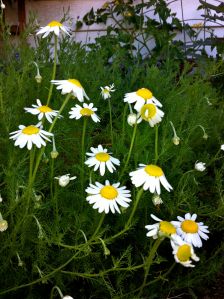Family: Asteraceae
Parts used: Flowers
Constituents: Volatile oil (alpha bisabolol, azulene, chamazulene & matricin), sesquiterpenes lactones, coumarins (umbelliferone), salicylic acid, choline, fatty acids, mucopolysaccharides, flavonoids (apigenin, luteolin, quercetin)
Medicinal actions: Mild nervous system sedative, anti-spasmodic, analgesic, anti-inflammatory, antiseptic, anti-emetic, carminative, anti-microbial, vulnerary, anti-ulcer, anti-allergic

Medicinal use: Matricaria is specific for use in all kinds of gastrointestinal disturbances associated with nervous irritability in the treatment of IBS and colitis. It’s safe to use in children and it’s powerful anti-inflammatory actions make it useful in almost any condition. Topically is is wound healing and a mild anesthetic useful for rheumatic & muscular pains and neuralgia.
Pharmacology:
- Volatile oils bisabolol, chamazulene, azulene & matricin are primarily responsible for anti-inflammatory, anti-spasmodic, and anti-microbial effects.
- Flavonoids like apigenin are antispasmodic and have sedative effects.
- Coumarins (umbelliferone) and anti-fungal and anti-bacterial.
- Sesquiterpene lactones possibly responsible for anti-allergenic effects.
Pharmacy: Infusion: 1-2 tsp/cup water; steep 3-5 min. covered; 1 cup TID. Tincture (1:5, 45%), 1-4 ml TID; max. weely dose 100 ml. Baths, Steams, Enemas. Note: Matricaria is best dosed on the low end of its dosage range over a long period of time.

Toxicity: Matricaria is a smooth muscle relaxant and therefore may contribute to miscarriage in pregnant women, especially before 12 weeks.
Contraindications: Early pregnancy.
Interactions: None known.

Sara Hearm (2015). The Naturopathic Herbalist
https://thenaturopathicherbalist.com/2015/09/10/matricaria-recutita/



